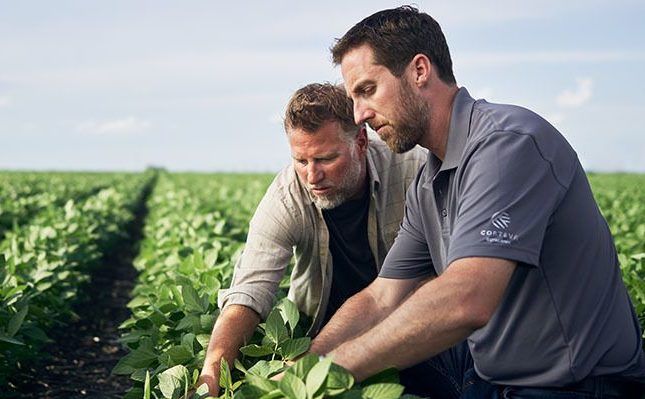This sponsored article has been published in partnership with America’s Cultivation Corridor.
Carbon markets in agriculture have been at the top of industry headlines, generating buzz about the potential for revenue opportunities for farmers and widespread adoption of regenerative practices to benefit soils and the climate. However, the development of new carbon sequestration marketplaces is complex and challenging, and requires collaboration and innovation at every stage of the process.
Companies, policymakers, and organizations in Iowa are leading the way to develop carbon markets and programs that encourage carbon sequestration in farming practices. The growth in the state’s startup ecosystem has sparked even more activity as established industry leaders are collaborating with farmers, researchers, and startups to build programs and opportunities that can benefit farmers, end users, and the planet.
Collaboration drives Corteva Agriscience
“The carbon marketplace is complex: we need technology enablers, measurement systems, a marketplace, buyers, and much more,” said Judd O’Connor, president, US Commercial Business, Corteva Agriscience. “This is not a zero-sum game; there doesn’t have to be one winner or loser. We are enabling farmers to unlock a market based on practices that are good for their soils, their business, and the planet, which is too much for one company or organization to develop on their own.”
Corteva Agriscience will expand its Corteva Carbon Initiative for the 2022 crop year, with a focus on the farmer and building partnerships. The program provides a simple path for farmers to maximize the value of their soil health practices, such as adding cover crops and reducing tillage.
“It starts with the farmer,” said Ben Gordon, Carbon and Ecosystems Services global portfolio leader, Corteva Agriscience. “We are taking a pragmatic approach and realize we can’t do everything. Finding the right partners helps us keep our farmer focus, and we have to be a good partner as well in order to best serve our farmers.”
Gordon noted that today’s farmers work with a team of advisors, so developing a carbon solution needs to incorporate multiple engagements including agronomists, retail partners, bankers, and other consultants. University researchers and extension professionals, as well as farm and commodity organizations and conservation groups, provide critical resources to develop solutions, gather farmer input, and share information.
“There has to be a degree of openness to building out a new market segment and approach to the marketplace for farmers,” Gordon said. He added that partnering with researchers and organizations with expertise around establishing cover crops in a production system, to host field days and demonstrations, has been valuable.
Corteva is also working with partners for measurement and marketing of carbon credits. A strategic collaboration with Indigo Ag is leveraging that company’s strong capabilities in measuring farmers’ carbon impact, generating independently verified credits, and accessing premium prices for those credits through an extensive buyer network.
Another collaboration with the Ecosystem Services Market Consortium (ESMC) will provide payments for third-party verified credits within the agriculture supply chain. ESMC is a nonprofit that works to compensate farmers and ranchers who improve the environment through their agricultural practices.
“It will take a lot of smart people to develop the process and marketplace for carbon, and we’ll need to work with longstanding companies and associations as well as new innovators and technology providers to ensure that farmers benefit,” said Gordon.
Corteva agronomic advisors will assist farmers in navigating the risks and rewards of investing in new soil health practices, while also helping farmers log their practices into the free version of Granular Insights, the company’s digital farm management tool.
Advancements in both the science and scale of carbon sequestration and marketplaces are key, said Gordon. Measuring soil carbon on a small scale is difficult; however, working with innovators and partners allows oversight of data on a large scale to determine what is realistic and scalable.
“As the science gets better, the scale goes up and the system improves,” he said. “When both the science and outcomes are aligned, uncertainties in measurement decrease, and farmers can in turn get paid more for their practices.”
Iowa leading the way
“Iowa is in a perfect position to lead efforts to build and scale carbon sequestration marketplaces,” said O’Connor. “It is exciting to see the focus on innovation and collaboration from companies of all sizes, world-class researchers at Iowa State, as well as farmers and policymakers.”
Iowa Governor Kim Reynolds formed the Iowa Carbon Sequestration Task Force in July 2021 with two workgroups to provide input, review relevant data and policy assessments, and shape goals and strategies to explore carbon sequestration and the opportunities it presents for further economic development in the state. The task force was formed as a recommendation from the Governors’ Economic Recovery Advisory Board to encourage economic growth and sustainability out of the Covid-19 pandemic.
“Iowa has a long and rich history of public-private partnerships to implement proven soil health and water quality practices. Carbon sequestration is and should be an extension of that work,” said Mike Naig, Iowa Secretary of Agriculture and vice-chair of the Governor’s Carbon Sequestration Task Force.
“Through the recommendations of this task force, and continued partnerships and outreach, we can bring the right research, expertise, and innovation together to build on Iowa’s strengths in conservation and renewable energy.”





